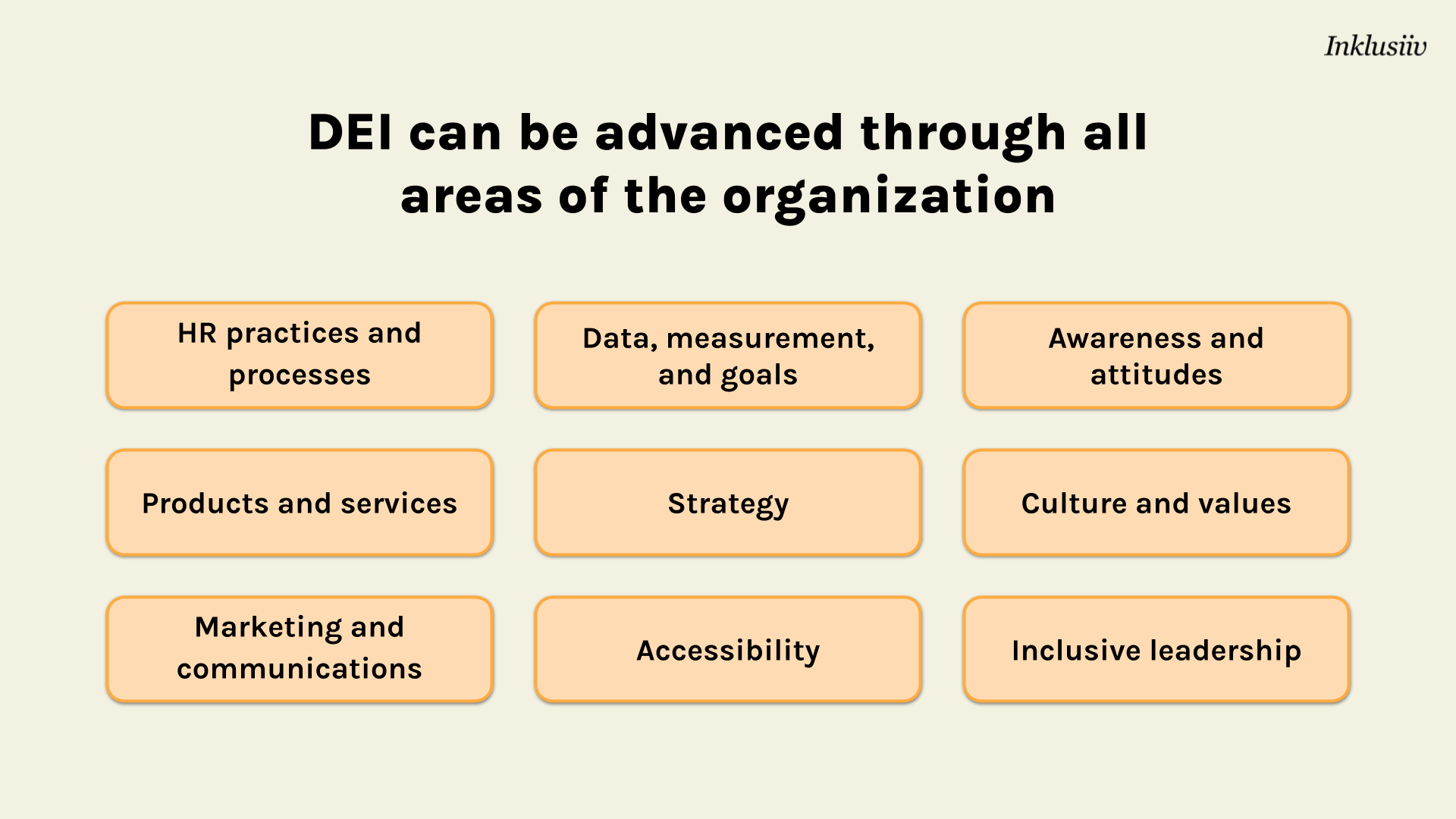Inclusion is not just a mindset – it requires real action. An organization is truly inclusive only when the people who make up the organization behave inclusively, both in their interpersonal interactions and in the context of the role they are carrying out.
A common misconception about DEI work is that it’s enough to have a few appointed people in charge of the agenda and running some key projects or events. In reality, project-based approaches are unlikely to lead to the desired outcomes. Organizations don’t change, people do. To become a truly diverse, equitable and inclusive workplace, we need people to see their role in this change, commit to it, and take action. To contribute their part of the puzzle.
The good news is that everyone has the power and opportunity to make a difference in DEI. Whatever your role is in the organization, you can make a difference.

What are some of the key roles and ways different groups can advance DEI? While the below is not an exhaustive list, we have outlined some of the key things to look out for. If you are responsible for leading or coordinating the DEI agenda in the organization you work for, ask yourself:
- How many of the below audiences have you engaged with?
- Who are you delegating responsibility to?
- Who are you bringing along on the journey?
The HR or People Team
When an organization begins their DEI journey, the work often (but not always!) starts in and from the HR or People Team. Recruitment practices influence how likely the organization is to recruit diverse employees, and HR policies and practices throughout the entire employee lifecycle have a significant impact on employee’s experiences of equity and inclusion.
While the HR team can have broad influence, it’s important that they are not seen as the only ones with responsibility for creating a more diverse, equitable and inclusive organization.

Senior leaders
Senior leaders set the direction for the organization. What they do and don’t talk about communicates what matters. If senior leaders don’t directly talk about the importance of diversity, equity and inclusion, it sends a message that these topics are not important enough to spare the time and attention. On the flip side, when senior leaders take the time to share their own reflections and their own voice to these topics, employees are more likely to perceive that DEI work is being taken seriously.
Senior leaders do not need to be experts in DEI to talk about the topics. It can in fact be more empowering and impactful if those in leadership positions are honest about their own learning needs, while making their commitment to the agenda clear.
Middle management and team leads
What middle managers say and do has a huge impact on how employees experience working in the organization in their day-to-day. Team leads are also in a key position in ensuring that the values of diversity, equity and inclusion translate into practice at the team level.
Managers set expectations for behavior within the team. They are in a position to both identify and directly address inappropriate behavior, and to make changes to team ways of working. They can also identify individual support and learning needs, and therefore directly influence experiences of equity.
Inclusive leadership skills are a leadership competency just like anything else. Identifying and building on these skills should be seen as an ongoing personal development area for all those in leadership positions.
Sustainability Team
DEI efforts directly contribute to social sustainability. Therefore the role of sustainability professionals is growing in the DEI space. Sustainability teams should work closely on these topics and link DEI work, targets and metrics into sustainability reporting.
DEI work should not be seen as a separate agenda, but wherever possible tied into other strategic workstreams, including sustainability and workplace wellbeing efforts.
Internal communications
A core element of successful DEI work is building a shared understanding of what diversity, equity and inclusion mean, and why they are important for your organization. Colleagues working in internal communications roles and functions can influence how much information is shared about these topics, and how often they are brought up in different communications channels.
Internal communications are important for bringing the topics to life, improving general awareness, celebrating successes and sharing stories. Organizations should use diverse internal communications channels to share information about DEI topics, and bring attention to the diverse experiences of different employee groups.
Communications about DEI topics should be seen as an ongoing practice, and a core part of the role of internal communications colleagues.
Product and / or Service Colleagues
Colleagues working in product or service design roles play a key part in ensuring that the outputs of the organization are created with diversity in mind. Inclusive design practices ensure that the needs of different customers and product or service users are taken into consideration in the production phases.
Diversity and inclusion should also be considered in the context of marketing, external communications and customer services. Colleagues working in these roles will have a direct impact on how inclusive the company is perceived from the outside, among customers, partners and other stakeholders.
All employees
At the end of the day, every single member of the team can do their part in making the working environment more inclusive. We all have a responsibility to learn about and identify the biases, stereotypes and prejudices that affect our behavior – consciously or unconsciously – and seek to prevent their impact on how we interact with others. We can give feedback to others when we notice they are not acting inclusively, and we should be open to receiving feedback on the same. We can all reflect on the language we use, how we treat our colleagues, and how we behave in various team situations such as meetings or social events.
It’s so easy to damage another person’s sense of inclusion even through the smallest of behaviors, as even micro-level actions can easily cause hurt and feelings of exclusion. We all have a responsibility to take accountability for our own learning, and in the words of Maya Angelou, do better when we know better.
DEI is everyone’s responsibility
Organizations that approach DEI holistically and aim to engage all employees with these topics have higher chances of long term impact and success – and true organizational change.
Taking a full-organization approach to DEI work can feel like a huge undertaking, so it’s important to plan out your steps and critically consider where to begin, and what approaches will work to engage your different audiences.
Every step counts, and every individual has the power to make a difference; big or small.

